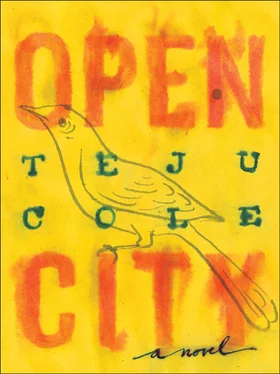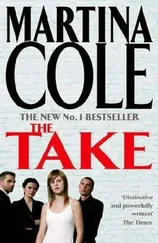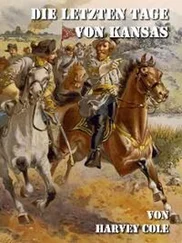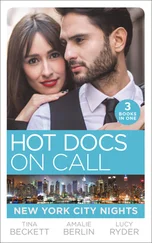I usually have great difficulty sleeping in noisy environments, I said, so it’s fair to say I envy such people, too. She brightened and said, Well, sometimes it’s an absolute necessity. By the way, do you prefer English or French? I recalled that the announcements on the intercom were already in three languages, as we flew over Long Island; I told her my French was poor. She asked where I was from. Oh, Nigeria, she said, Nigeria, Nigeria. Well, I know a great many Nigerians, and I really should tell you this, many of them are arrogant. I was struck by her manner of talking, the unapologetic directness of it, the risk of alienating the person she was talking to. She was at an age, I supposed, at which she had long ceased to care what other people thought. This directness could certainly be taken in the wrong way if it came from a younger person, but there was no such risk in this case.
Ghanaians, on the other hand, Dr. Maillotte went on, are much calmer, easier to work with. They don’t have such a big concept of their place in the world. Well, I suppose it’s true, I said, we are a bit aggressive, but I think the reason is that we like to get ahead, make our presence felt. We think of ourselves as the Japanese of Africa, without the technological brilliance. She laughed. She put her book away, and when the dinner cart came by, we both selected the fish option on the menu — microwaved salmon, potatoes, dry bread — and ate in silence. Then I asked what she did. I’m a surgeon, she said, retired now, but I did gastrointestinal surgery in Philadelphia for the last forty-five years. I told her about my residency, and she mentioned the name of a psychiatrist. Well, he used to be there, maybe he’s gone now. This is all so long ago, anyway. Did you have any rotations at Harlem Hospital? I shook my head and told her I’d gone to medical school outside the state. I only mention it because I consulted there a few times recently, she said, I’m retired, but I wanted to participate in a voluntary thing, so I’ve been in Harlem. I was a little unfair earlier, she added, I should say the Nigerian residents are excellent. Oh, don’t worry about it, I said, I’ve heard much worse. But tell me, there aren’t many American residents at Harlem Hospital, are there? Oh, they have a few, but yes, a lot of Africans, Indians, Filipinos, and really, it’s a good environment. Some of these foreign graduates are a lot better trained than people who went through the American system; for one thing, they tend to have outstanding diagnostic skills.
Her diction was precise, and the accent only vaguely European. She told me that she had done her training in Louvain. But you must be a Catholic to be a professor there, she said with a chuckle. Not so easy for an atheist like me: I’ve always been one, I’ll always be one. Anyway, it’s better than Université Libre de Bruxelles, where no one can achieve anything professionally without being a Mason. I’m serious: it was founded by Masons, and it’s still a kind of Masonic mafia. But I like Brussels, it is still home, after all these years. It has its advantages. For one thing, it’s color-blind in a way the U.S. is not. I have been spending three months each year there since I retired. I have an apartment, yes, but I prefer to stay with my friends. They have a big house, it’s in the southern part of the city, in Uccle. Where will you be staying? Ah, right, well it’s not far from there, you just go south from Parc Léopold, and that’s the neighborhood. If you had a map, I would show you.
Then, as if the talk of Brussels had gently pushed a door in her memory ajar, she said: Belgium was stupid during the war. The Second World War, I mean, not the First, I was born much too late for the First. That was my father’s war. But I was just about to enter my teens during the Second World War, and these damned Germans, I remember them coming into the city. The blame really is on Leopold III; he made the wrong alliances or, I should say, he refused to make alliances, he thought it would be easy to defend the country. He was an old fool. There was a canal from Antwerp to Maastricht, you see, and a line of concrete fortifications, and this was supposed to be the perfect defense, this line. The idea was that the water would be too difficult to bring a large army across. Of course, the Germans had planes and paratroopers! All it took was eighteen days, and the Nazis marched in, and stayed, like parasites. The day they finally left, the day the war ended for Belgium, was the happiest day of my life. I was fifteen, and I remember that day perfectly, I will never forget that day as long as I live, and I’ll never be happier than I was that day. And here she paused, extended her hand, and said, I suppose I should introduce myself. Annette Maillotte.
Then she went on, falling deeper, it seemed, into her memory, telling me about her days as a young girl, how difficult things had been during the war, how Leopold III had bargained with Hitler for better rations, the devastation of the countryside afterward, when straggling figures covered the landscape and went from house to house begging for food and shelter, her decision to go into medicine, then her subsequent training in surgery, which was unusual for women at the time. Somehow, as she spoke, I could still see in her that resolute girl.
You must have been determined, I said. Well, no, no, you don’t think of it like that, she said, you just find what you must do, and you do it. There’s really no opportunity to stop and praise yourself, so I won’t say determined. I nodded. Listening to her, I felt as if the objective fact of her age — if she was fifteen when the war ended, it meant she had been born in 1929—stood in an indirect relationship with the fact of her mental and physical vitality. At that moment, the flight attendants came to take our trays away, and Dr. Maillotte took up her book again. I lowered the light above my seat and, closing my eyes, imagined the frigid nighttime Atlantic racing by below us.
Although I was tired, I managed to sleep only fitfully, and woke again after a few hours, with a sore neck. Dr. Maillotte must have slept as well, but by the time I woke, she was again reading. I asked her how the book was. Yes, it’s good, she said, nodding, and went back to reading. I signaled that I had to go to the bathroom and apologized for disturbing her. She stood up in the aisle, and was still standing when I came back. I have to keep the circulation moving, she said, especially important when you’re as old as I am. When we sat down again, she said: Do you know Heliopolis? It’s in Egypt, just outside Cairo. Helio-Polis, it means city of the sun, sun city. Well, I told you I was going to stay with a friend of mine in Brussels. His name is Grégoire Empain, and we’ve been friends since we were young, maybe when we were both twenty, and it was his grandfather who built Heliopolis.
If you ever get a chance to go there, you should. It’s a fantastical place, and Édouard Empain, or Baron Empain as they call him, was the engineer who designed and built it. That was in 1907. It was a real luxury capital, broad avenues, big gardens. There’s a building there called Qasr Al-Baron, the Baron’s Palace, that was modeled on Angkor Wat in Cambodia and also on a Hindu temple, a specific one, but I don’t recall the name. And you know, this is now the most important suburb of Cairo; in fact it’s within the city boundaries now. The president of Egypt lives there today. But the Empains are in a tussle with the Egyptian government, because part of Heliopolis belongs to them, and they are trying to claim it, or at least get compensated for it. The family is still wealthy, anyway, one of the wealthiest in Belgium. Baron Empain was a great industrialist — not just Heliopolis, he built the Paris Métro as well, when the Belgians wouldn’t let him build one in Brussels — and his son was an industrialist also. The grandson Grégoire is modest, he doesn’t like to be in the limelight. But Grégoire has a brother, Jean, and he’s a different story.
Читать дальше












